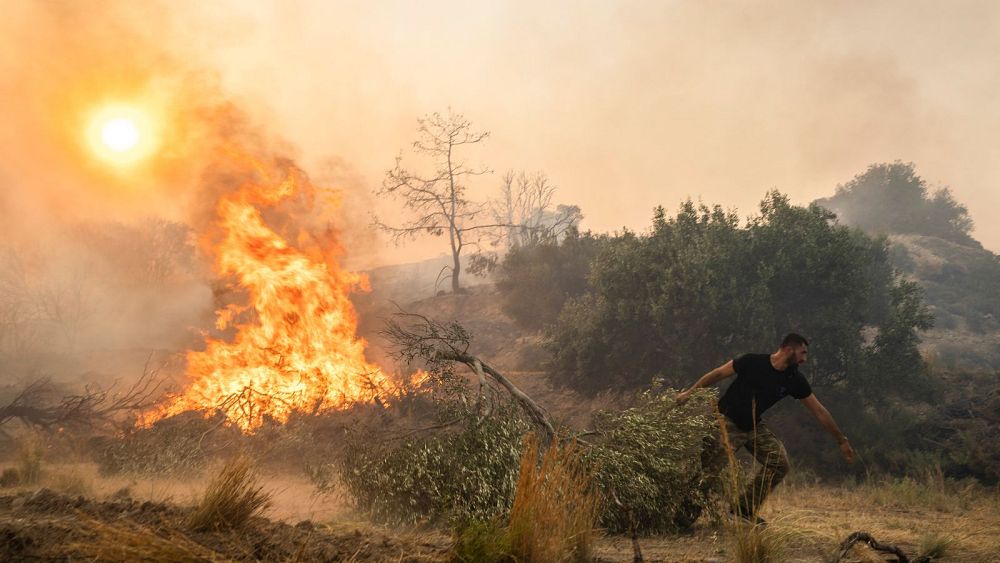
The climate-fuelled wildfires unleashed the same CO2 emissions last month as over 222,000 cars driven in a year.
In total 1,470 wildfires swept through the country in July, Greek Civil Protection and Climate Crisis Minister Vassilis Kikilias announced on Tuesday, scorching around 190,200 hectares.
The fires unleashed a megaton (one million tonnes) of CO2 emissions into the atmosphere, an earlier survey by the EU’s Copernicus Atmosphere Monitoring Service (CAMS) found.
That’s roughly equivalent to the pollution from 222,500 cars driven in a year, 500,000 kg of coal burned, or 2.3 million barrels of oil consumed, using the US Environmental Protection Agency’s calculator.
“The current ongoing heatwave affecting Greece and the Mediterranean has increased the wildfire risk which is reflected in the high observed intensity of the wildfires around the Mediterranean,” CAMS senior scientist Mark Parrington said last week.
The wildfires are behind the country’s highest emissions for this time period in 21 years.
How did the heatwave intensify the wildfires?
Between July 15 to 31, seven large forest fires occurred in Greece, including on Corfu and Rhodes, Copernicus’ Rapid Mapping Service shows.
The number of wildfires sparked this summer wasn’t unusual, a new report from the National Observatory of Athens (NOA)’s meteo service notes.
But the climate-driven heatwave meant they spread with abnormal intensity.
“The very high temperatures and dry atmospheric conditions that affected our country during the recent heatwave also created an environment extremely favourable for the outbreak of large forest fires,” the report states.
It points to a significant increase in flammability or (ease of ignition) and speed of spread in the affected areas. There is an “urgent need” to monitor such “pyrometeorological conditions”, it says, in order to increase the country’s preparedness for wildfires.
Approximately 222,577 hectares (almost 2 per cent of Greece’s total land) have been destroyed by wildfires since the beginning of 2023, according to the European Forest Fire Observatory.
That is already 30 per cent more than the annual average, the meteo report notes.
How have the Greek wildfires affected air quality?
“With several more weeks left in the summer we will continue to closely monitor the fire emissions and potential air quality impacts across the region,” added Parrington.
It’s not just residents in Greece that need to watch out for the air pollution.
CAMS forecasts of particulate matter and other pollutants associated with wildfire emissions have shown smoke transported southward across the Mediterranean. This has been confirmed by visible imagery of the smoke plumes from different satellites.
This shows how these wildfires will affect the air quality downwind of the fires both locally and around the wider Mediterranean region, say Copernicus experts.
Keeping track of the smoke transport is key to taking the appropriate measures to minimise any potential impacts, they add.
What is the wider environmental impact of the Greek wildfires?
It will take time to assess the full environmental impact of the wildfires in Greece and elsewhere in southern Europe this summer.
The European Forest Fire Information System (EFFIS) – another Copernicus service – reported that more than 173,000 hectares of EU forest had been reduced to ashes as of 22 July. That’s more than double the average of 80,000 hectares recorded from 2003 to 2022.
As well as the vast amount of emissions unleashed by high-intensity blazes, the loss of biodiversity in these fragile ecosystems is an increasing concern for many environmentalists.
Last week Greek Prime Minister Kyriakos Mitsotakis described the country as being “at war”. “The climate crisis is already here, it will manifest itself everywhere in the Mediterranean with greater disasters,” he told Parliament.
The PM later added that “The climate crisis may be a reality, but it cannot be an excuse.”
“Our country ought to take more steps […] to be ready to mitigate, as much as possible, the effects of a reality that we are already starting to feel, and that could have dramatic effects on many different aspects of our economic and social life,” he said.
